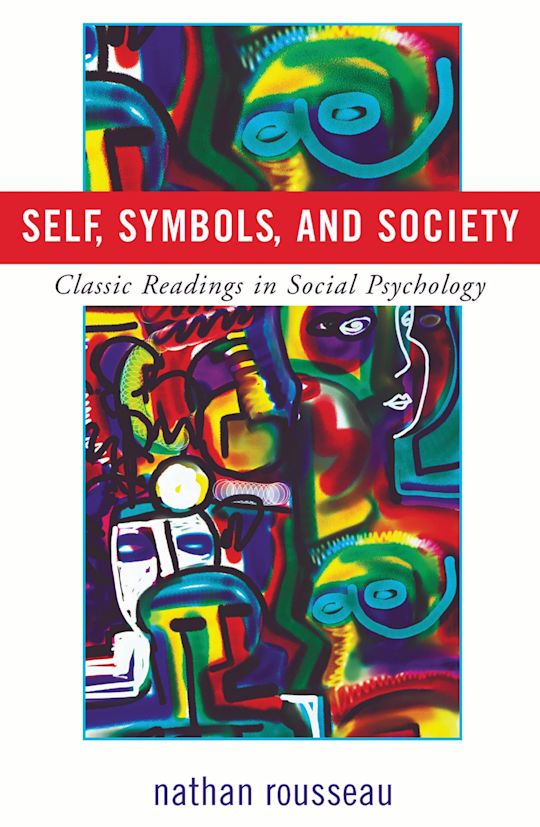- Home
- ACADEMIC
- Psychology
- Psychology - Other
- Self, Symbols, and Society
Self, Symbols, and Society
Classic Readings in Social Psychology
- Textbook
Self, Symbols, and Society
Classic Readings in Social Psychology
- Textbook
Buy from Bloomsbury eTextBooks
You are now leaving the Bloomsbury Publishing website. Your eBook purchase will be with our partner https://www.vitalsource.com.
Your credit card statement will show this purchase originating from VitalSource Technologies. They will also provide any technical assistance you might require.
You must sign in to add this item to your wishlist. Please sign in or create an account
Description
Students of social psychology can read in this new text original writings assembled from the founders of sociology in the nineteenth century to the latest influential works by contemporary sociologists today. Rousseau's introductory sections provide biographical and theoretical context that bridges the intellectual developments in each chapter and orients students to the topics and themes ahead.
The classic essays comprising this book are presented chronologically, but fall into two major branches of study: symbolic interaction and personality and social structure. This book shows the significant contributions made in these areas and demonstrates how these two branches share a common history.
Together the readings lead students to a greater realization that there is much potential power in the hands of individuals. The value of studying social psychology is in acquiring a greater appreciation of not only of oneself, but also of how one's behavior is affected by, and affects, social interaction and the larger society. Readers can gain from this book a greater appreciation of social history, deeper self-knowledge, and a heightened sense of civic concern and responsibility.
Table of Contents
Chapter 2 Emile Durkheim on The Division of Labor in Society
Chapter 3 Max Weber on Social Action
Chapter 4 Georg Simmel on the Social Development of Individualism
Part 5 Early-to Mid-Twentieth-Century Developments
Chapter 6 Charles Horton Cooley's Concept of the Looking-Glass Self and Its Applications
Chapter 7 William I. Thomas on the Definition of the Situation
Chapter 8 George Herbert Mead on Self and Society
Chapter 9 Alfred Schutz on Society and Intersubjectivity
Chapter 10 Karl Mannheim on Self, Society, and the Sociology of Knowledge
Part 11 Mid-Century Critiques and Refinements
Chapter 12 David Riesman on Social Character
Chapter 13 Erving Goffman on the Presentation of Self
Chapter 14 Peter Berger and Thomas Luckmann on the Social Construction of Self and Society
Chapter 15 Herbert Blumer on Symbolic Interactionism
Chapter 16 Harold Garfinkel on Ethnomethodology
Part 17 Last Quarter Century
Chapter 18 Arlie Russel Hochschild on the Management of Emotion
Chapter 19 Robert Bellah et al. on Individualism and Community in America
Chapter 20 Where Do We Go from Here? Toward a Theory of the Cycle of Individualism
Product details
| Published | 16 Apr 2002 |
|---|---|
| Format | Ebook (Epub & Mobi) |
| Edition | 1st |
| Extent | 288 |
| ISBN | 9781461715221 |
| Imprint | Rowman & Littlefield Publishers |
| Publisher | Bloomsbury Publishing |
About the contributors
Reviews
-
This judicious selection from the classics overcomes the conventional, but misleading division between individual and society through a sociological social psychology. The volume provides a clear and definitive answer to the basic question: How do individuals and society relate? As an excellent introduction to the study of society through the dual traditions of symbolic interactionism, and personality and social structure, Self, Symbols, and Society uniquely combines selections from Europe and America to provide the student with an appreciation of the scope and depth of sociology and social psychology. A singular achievement.
Brian Turner, Cambridge University
-
At last, there is a reader that offers students and professionals alike some of the key readings of the social psychologists who have set much of the theoretical agenda for sociology over the last one hundred years. The great strength of the book is making many of the classic statements on micro-social processes accessible to students. This book will prove very useful in undergraduate and graduate courses on social psychology, theory, and micro-social processes.
Jonathan Turner, University of California, Riverside




































